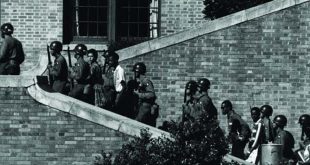 Milorad Vučelić, editor in chief
Milorad Vučelić, editor in chief
The Hague Tribunal has delivered its verdict in the retrial of Ramuš Haradinaj. We should not let it slip our minds that a Serbian court has already quashed the prosecution and effectively cleared war criminal Ilija Jurišić, and also that our Ministry of Justice and War Crimes Prosecutor played a role in motivating the British legal system to drop charges against Ejup Ganić by its perfunctory and unpersuasive briefs. If there ever was any hestitation in London, which I doubt, the „evidence“ from Belgrade should have helped them to decide. It was a great contribution, not just to the seeming vindication of defendants on war crimes charges against Serbs, as already remarqued, but was also for them a form of rehabilitation.
So how can we now expect that The Hague Tribunal will fail and deprive our negotiators of the pleasure of seeing Haradinaj also, after dealing with Tači. Pity them, they believe that the Serbs have really lost some wars with Tači and Haradinaj, so they try to ingratiate themselves and to motivate the Albanians to show a measure of mercy and to restore at least a bit of what, as they say, has been „taken from us“. The propitiation of the cowardly KLA gangsters and organ harvesters is proceeding under the patronage of some of our greatest friends, those who bombed us for „humanitarian reasons“, in fact. They are the very ones who are now demanding not just that we recognise but also accept the independence of Kosovo, presumably also for humanitarian reasons and our own good. We should thus assist the process of international recognition of „that state“ by an increasing number of countries, as recommended and ordered by William Kennard, U.S. ambassador to the European Union.
In the meantime, while the internationally integrated Kosovo border is being constructed, the border marking process in other parts of Serbia is in progress. These are not exactly border crossings, for the time being, but memorials to various criminals and their terrorist organizations, starting in Preševo and Bujanovac and presumably to continue from there. We are not far from building a monumental replica of the Yellow House of organ harvesting fame (not a mere model). It could well become the most important landmark of south Serbia and a civilisational symbol of greater Albania ambitions, and it could also serve as evidence of Serbian commitment to the Euro-Atlantic integration process. It might be a brand new and modern conceptual version of the Tower of Skulls in Niš, only this time consisting of the violently harvested Serbian organs, territories, history, tradition and lands.
From Vojvodina, the same old refrain [„Where did our money go?“] is being heard. Instead of being told to pop their question to the „Development bank of Vojvodina“ or to Minister Dragin and numerous firms which squandered their subsidies, or to Croatian firms which bought up their real estate, or from Jerković and Stanaj, they are receiving kid gloves’treatment in the vain hope that they might show some respect for the Serbian Contitution, the very document they not just do not respect but openly undermine. They are always commemorating something, like their counterparts from Preševo and Bujanovac. They do not celebrate memorable events from Serbian history, they merely commemorate them, as Ištvan Pastor said it loud and clear.
Speaking about the state, intense US and European efforts and activities are going on these days. A catalog of their demands and blackmails being too lengthy to enumerate, but it may be reduced to the common position that the Serbs are not entitled to have a state. The state is therefore under frontal assault. If the state and all its attributes were to be taken away from Serbs, nothing would be left to join anything, not even the European Union.
The only voice that is different and decisive comes from Russia (if only there were anyone to hear it). It emanates from the crystal clear pronouncements made by the Russian deputy premier, Dmitry Rogozin, during his vistit to Belgrade: unlike others, Russia is not only willing and has the money to help Serbia, but also considers the use of blackmail to coerce the independence of Kosovo shameful and unacceptable. Naturally, it has been pointed out over and over again that Russia is not going to act as advocate to anyone who is rushing to humbly accept imputations of fabricated guilt (read „The great illusion of the Hague“ by Nikola Vrzić in the latest issue of „Pečat“), and who grovels before his overt enemies as they dish out to him nothing but humiliation, not even a small carrot being anywhere in sight, nor will Russia jump into the fire for someone expecting Russians to be more Serbian than Serbs themselves ought to be. Enough said, for all responsible and intelligent people!
Thus the rhetorical defense of Serbia could be reduced to the saying: „The fool defending a dead man’s grave“. Many people in Serbia expect Russians not only to be more Serbian than the Serbs but perhaps even to stop being Russians. These are familiar thought patterns that guided Tadić’s policy of „no alternatives“ and that reflect the interests of the political Yellow Cartel.
The agreed changes at the top of the Yellow Cartel, still known in places as the Democratic Party [DS], that took place during the previous week in the form of democratic elections won by Dragan Djilas now tend to be presented as a major political issue and even a quantum leap. We are facing yet another attempt to transform classical criminal issues into a political problem. The point does not at all have to do with particular criminal acts or discrimination. There is plenty of it, to be sure, but there are people whose job is to deal with such phenomena. The point is the systematic ravaging of the government budget. Most business and political projects are based on plain plunder of public revenues collected through state taxes and huge indebtedness abroad. Publicly owned companies become money-making machines for yesterday’s potentates. Goverment subsidies end up in private pockets with the eager assistance of high government officials and political functionaries using the National Assembly of Serbia as a safe house, trying to get elected to political office in order to cover and protect themselves with the resulting immunity.
No abuse was left uncommitted by the former authorities and they are now a pathetic bunch to watch as they feign an Opposition deeply concerned about the destiny of a country that they left on the verge of collapse.
Most disgusting of all are their attempts to misrepresent efforts to bring malefactors to justice as political persecution. Their misdeeds while in office were covered up by their control of the media, dominion over law enforcement and control of the prosecutorial apparatus. If by chance anything did become public, it would soon be swept under the rug.
For example, there was considerable information on the privatization of the Fertilizer factory in Pančevo as well as about wheat and fertilizers trading, but it never occurred to anyone to start an investigation into these matters. There was no need to make anything up, not even for the determined Vučić. What is worse, immunity made the robbers neither cautious nor restrained. On contrary, they became greedier and their depredations more outrageous as a result of political protection. A well argued case was made about multitudinous embezzelments connected to the construction of the Ada bridge, the „Bus plus system“, about huge unjustified incomes, the advertising monopoly, and corrupt relationships with government-owned corporations (see our investigative article in the latest issue of „Pečat“: „Dragan Djilas and Serbian multicompanies“); it was also written about hidden ownership in the media, evidence of enormous growth of Djilas’s companies since DS came to power has been published, at the same time Audit Commission findings were attacked loudly and brazenly…
So finally, the view began circulating that „Vučić’s anti-corruption campaign is just a way to go after Djilas“ and that the latter’s sacking in Belgrade „violates the electoral will of citizens“ and constitutes political prosecution of the newly enthroned boss of the Yellow Cartel.
It appears that the perpetrators of certain criminal acts will be prosecuted regardless of political cover-ups and invocations of immunity. The court will decide whether or not someone is guilty. There is, however, no doubt that the former authorities worked as a team to accomplish the economic ruin and political destruction of the Republic of Serbia. That was their settled policy, which included the destruction of institutions, a Euro-Atlanticist foreign policy, organized attempts to undermine cultural identity and active particiption in the fragmentation of Serbia, the consequences of all of which are yet to become wholly apparent and visible. Whatever might be the final verdict of the courts, it is the previous regime which will bear the guilt for it.
 Печат – Лист слободне Србије Политички недељник, актуелна политичка дешавања, друштво, свет, култура.
Печат – Лист слободне Србије Политички недељник, актуелна политичка дешавања, друштво, свет, култура.






